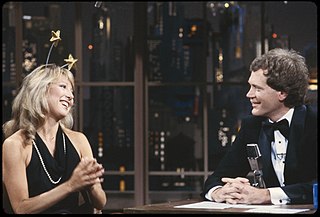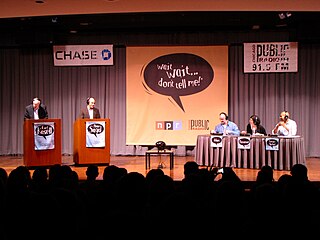Talk radio is a radio format containing discussion about topical issues and consisting entirely or almost entirely of original spoken word content rather than outside music. They may feature monologues, dialogues between the hosts, interviews with guests, and/or listener participation which may be live conversations between the host and listeners who "call in" or via voice mail. Listener contributions are usually screened by a show's producers to maximize audience interest and, in the case of commercial talk radio, to attract advertisers.

A talk show is a television programming, radio programming or podcast genre structured around the act of spontaneous conversation.A talk show is distinguished from other television programs by certain common attributes. In a talk show, one person discusses various topics put forth by a talk show host. This discussion can be in the form of an interview or a simple conversation about important social, political or religious issues and events. The personality of the host shapes the tone and style of the show. A common feature or unwritten rule of talk shows is to be based on "fresh talk", which is talk that is spontaneous or has the appearance of spontaneity.

A panel show or panel game is a radio or television game show in which a panel of celebrities participate. Celebrity panelists may compete with each other, such as on The News Quiz; facilitate play by non-celebrity contestants, such as on Match Game and Blankety Blank; or do both, such as on Wait Wait Don't Tell Me. The genre can be traced to 1938, when Information Please debuted on U.S. radio. The earliest known television panel show is Play the Game, a charades show in 1946. The modern trend of comedy panel shows can find early roots with Stop Me If You've Heard This One in 1939 and Can You Top This? in 1940. While panel shows were more popular in the past in the U.S., they are still very common in the United Kingdom.
Crossfire is an American nightly current events debate television program that aired on CNN from June 25, 1982, to June 3, 2005, and again from September 9, 2013, to August 6, 2014. The format was designed to present and challenge the opinions of a politically liberal pundit and a conservative pundit.

Pardon the Interruption is an American sports talk television show that airs weekdays on various ESPN TV channels. It is hosted by Tony Kornheiser and Michael Wilbon, who discuss, and frequently argue over, the top stories of the day in "sports... and other stuff".

Max Kellerman is an American sports television personality and boxing commentator. Until his departure from ESPN in June 2023, he was the host of This Just In with Max Kellerman and the co-host of Keyshawn, JWill and Max on ESPN Radio. He previously was a co-host of ESPN talk show First Take alongside Stephen A. Smith and Molly Qerim. He also previously was the co-host of the sports radio talk show Max & Marcellus, with Marcellus Wiley, on ESPNLA. Kellerman hosted the ESPN panel talk show Around the Horn from the show's incarnation in 2002 until 2004 and co-hosted the sports comedy talk show SportsNation, alongside Wiley and Michelle Beadle, from 2013 until 2016. He was also a studio commentator with Brian Kenny on Friday Night Fights and a color commentator for HBO World Championship Boxing and Boxing After Dark.

Around the Horn (ATH) is an American sports roundtable discussion show, conducted in the style of a panel game, produced by ESPN. The show premiered on November 4, 2002, as a replacement for Unscripted with Chris Connelly, and has aired daily at 5:00 p.m. ET on ESPN ever since. The show has been recorded in New York City since September 8, 2014, and has had over 4,000 episodes aired as of 2020. The program emanated from Washington, D.C., where it was located in the same facility as Pardon the Interruption (PTI). Production still is based in Washington, D.C. The moderator for the show is Tony Reali, who has hosted the program since 2004, replacing Max Kellerman, and also served as the statistician on Pardon the Interruption until the show's relocation to New York.

Crossballs: The Debate Show is a Comedy Central television show which poked fun at cable news networks' political debate shows, especially CNN's Crossfire and MSNBC's Hardball with Chris Matthews. In each episode, comedians posing as experts on a particular subject would debate two real commentators. The true experts were unaware that the show was a sham. Topics ranged from reality television to religion to violence in video games.
ESPNews is an American multinational digital cable and satellite television network owned by ESPN Inc., a joint venture between The Walt Disney Company and Hearst Communications.
The second season of Dream Job, the ESPN American reality television show that searches for new on-air talent for the network, began on Tuesday, September 14, 2004. Like the show's first season, this edition was also looking for a new anchor for SportsCenter. A talent search for the show had begun in late June, 2004. ESPN anchor Stuart Scott returned to host the new season.
In broadcast programming, dayparting is the practice of dividing the broadcast day into several parts, in which a different type of radio programming or television show appropriate for that time period is aired. Television programs are most often geared toward a particular demography, and what the target audience typically engages in at that time.
Sports radio is a radio format devoted entirely to discussion and broadcasting of sporting events. A widespread programming genre that has a narrow audience appeal, sports radio is characterized by an often-boisterous on-air style and extensive debate and analysis by both hosts and callers. Many sports talk stations also carry play-by-play of local sports teams as part of their regular programming

Tucker is an American television program on MSNBC that focused on politics, hosted by Tucker Carlson. The show aired from June 13, 2005 to March 14, 2008.
1st and 10 was a sports talk and debate television program spun off from ESPN2's Cold Pizza morning show.
The Sports Reporters was a sports talk show that aired on ESPN at 9:30 a.m. ET every Sunday morning. It featured a roundtable discussion among four sports media personalities, with one regular host and three rotating guests. The show began in 1988, patterned to some extent after the Chicago-based syndicated show called Sportswriters on TV.

This page describes the student-run television station of The George Washington University. See also: Great West Television

Fox Sports 1 (FS1) is an American pay television channel owned by the Fox Sports Media Group, a unit of Fox Corporation.

The Debaters is a Canadian radio comedy show currently hosted by Steve Patterson. It airs on CBC Radio One, Saturdays at 3:00PM (PDT) and Wednesdays at 11:30AM, Eastern Time.
Woodrow Wilson Paige Jr. is a sports columnist for The Gazette, author, and a panelist on the ESPN talk show Around the Horn. He was a columnist for The Denver Post for 35 years, and co-host of Cold Pizza and its spin-off show 1st and 10 until November 2006, when it was announced that Paige would return to the Post. Paige is a member of the Pro Football Hall of Fame committee and is a Baseball Hall of Fame voter.

Fox Sports Live is an American sports news program that aired on Fox Sports 1. It was hosted by Canadian sportscasters Jay Onrait and Dan O'Toole, who had been well-known locally for their late-night editions of TSN's SportsCentre.











